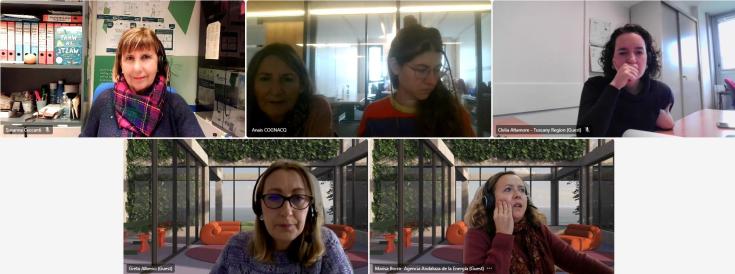What can we learn from each other? A trilateral exchange
The discussions was focused on how some actions and Good Practices carried out by AEA and ALEC might be inspiring to improve the way Tuscany Region (ARRR) supports RECs of its territory and viceversa.
Points addressed during the call, which took place online on January 29th
1) How to include vulnerable groups on the Tuscan Call for RECs (AEA)?
ALEC – Is Investigating the topic of Energy poverty from AEA. Marisa Borra from AEA explains that Torreblanca Ilumina is a pilot action coming from an Interreg project called POWERTY.
They have a study from Manchester University (energy poverty observatory) that studies the common definition of energy poverty. In Spain they have a specific vulnerable population strategy so they can use ERDF funds. Alec is interested in the deliverable and Marisa will send it to the group.
AEA would like to realize a pilot action (like Torreblanca Ilumina – municipal level) at a regional level, and asks if Alec and ARRR have a similar project to share, but unfortunately they don’t have anything at regional level for the moment.
For Torreblanca they involved and have an agreement with local social workers that know very well the family conditions of inhabitants. AEA coordinates the call for proposal, they start a group (pioneer group) they organize meetings with people where they teach how to read energy bills, they collaborate with electricity companies and cooperatives. The municipality creates a multitasks office where they organize workshops, giving advice to citizens on energy, meetings with students on energy saving, they explain energy free market. They have chosen 15 vulnerable families (single parents, old people..ecc) and 2 schools to be part of the REC. The PV panels have been donated by a NL company. Students can study RECs, see the installation over the roofs and analyse the display with all production data. They give also instructions for the maintenance of the PV plant.
AEA realizes Torreblanca Ilumina project with the involvement of 3 person (not full-time) and they monitor the vulnerable families economic situation in order to be sure it doesn’t change.
In Spain they have a Local and regional network of energy agencies called ENERAGEN (Working Group with 30 agencies involved) focused on RECs, like in Italy we have RENAEL and also in France (AEA are the President of the network at the moment).
Marisa will send some documents for Alec and ARRR
Here some links provided by AEA:
https://research.manchester.ac.uk/en/persons/stefan.bouzarovski
https://projects2014-2020.interregeurope.eu/powerty/contacts/
https://energy-poverty.ec.europa.eu/
https://www.agenciaandaluzadelaenergia.es/es/biblioteca/guia-juridica-para-el-desarrollo-de-comunidades-energeticas-en-zonas-vulnerables
https://projects2014-2020.interregeurope.eu/powerty/library/
2) Feasibility studies financement (ALEC)
ARRR asks ALEC concerning the topic of financing the pre-feasibility studies in the call for proposal for RECs, because they would like to propose to Tuscany Region and introduce it in the regional call.
If there is a swot analysis and we support the feasibility study, the result of one REC is good for the others and all the results can be shared by other RECs and good for everybody.
ARRR has explained that in the call for RECs (not launched yet) there could be a reward (max 5 points) for RECs including vulnerable groups and the pre-feasibility studies could be financed (10% of the total eligible expenses and a total amount of up to 30.000 €).
This is interesting for Alec and ARRR will send a presentation from Tuscany Region with the slides that report these awarding criteria
ARRR will send the partners the power point presented by Tuscany Region (Eng. Marangolo) during the Florence event dedicated to the launch of the RECs Observatory of INVECE project (see link here)
In the picture:
For ALEC: Anais Cognaq - Valérie Degrange
For AEA: Marisa Borra
For ARRR: Susanna Ceccanti - Greta Alberici
For Tuscany Region: Clelia Altamore

